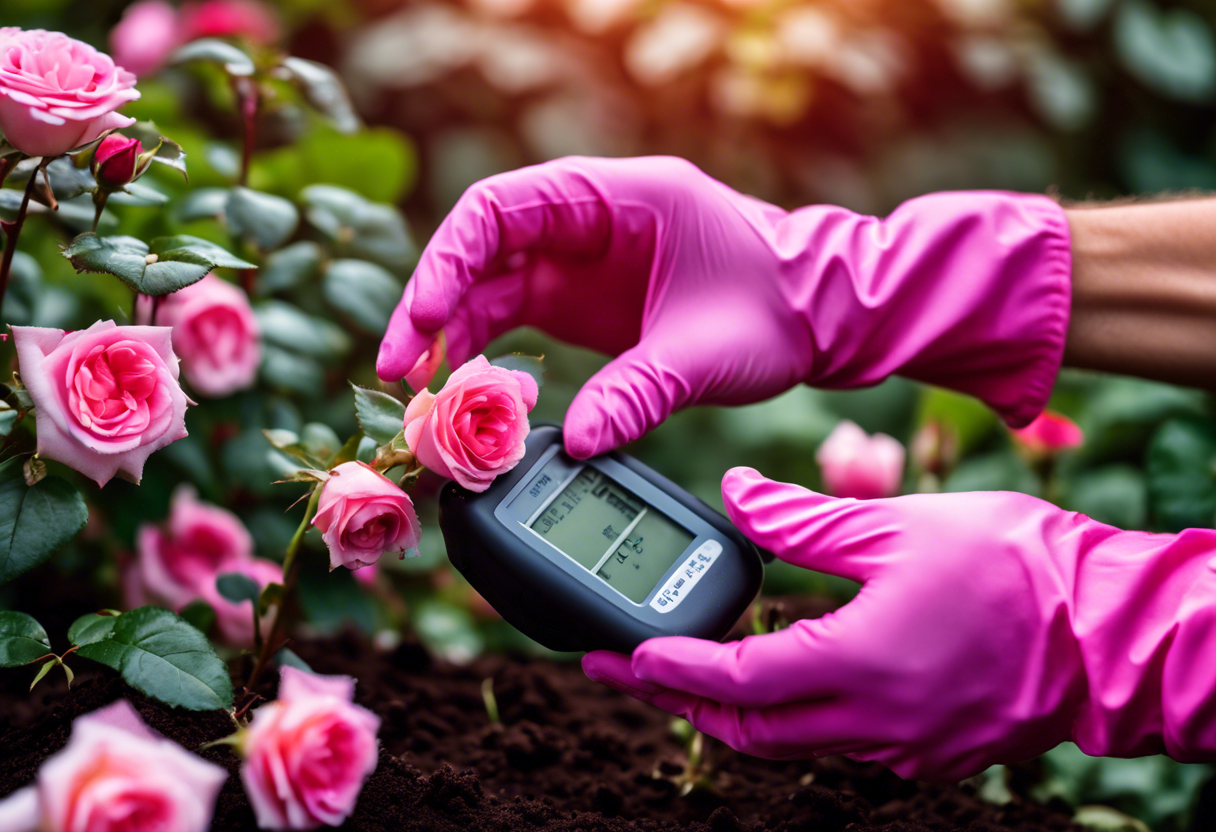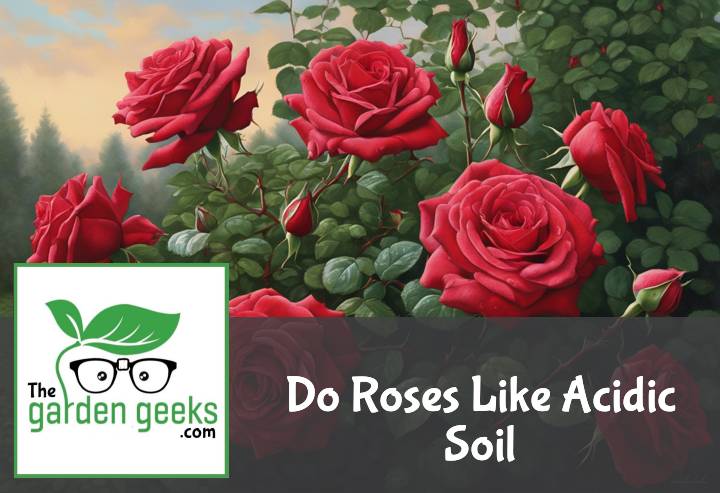Ever found yourself in a garden, admiring the beauty of roses and wondering, Do Roses Like Acidic Soil? Well, you’re not alone! I’ve been there too, with my gardening gloves on and a puzzled look on my face.
In our quest to grow the perfect rose, we often overlook one crucial detail – the soil’s pH level. But fret not! We’re about to dig deep into this topic. So buckle up and let’s get our hands dirty together! “Keep reading about Do Roses Like Acidic Soil?”
Key Takeaways
- Roses prefer slightly acidic soil with a pH between 6.0 and 6.5.
- They can tolerate more acidic conditions, but growth may be hindered.
- Soil acidity affects nutrient availability, which is crucial for rose health.
- Regular soil testing is recommended to maintain optimal pH levels.
- If the soil is too acidic, adding lime can help balance the pH.

What is the Ideal Soil pH for Roses?
When it comes to roses, they’re not too picky about their soil. But if you want them to thrive, the ideal soil pH for roses is slightly acidic, between 6.0 and 6.5. This range provides an optimal environment that promotes healthy rose growth.
Why this specific range, you ask? Well, it’s all about nutrient availability. At this optimal pH range, essential nutrients like nitrogen, phosphorus, and potassium are readily available for absorption by the rose roots. So basically, a happy pH equals happy roses!
Understanding Soil pH
Let’s dive into what we mean by soil pH. It’s a measure of how acidic or alkaline your soil is. Think of it as the soil’s mood ring! The scale goes from 0 (very acidic) to 14 (very alkaline), with 7 being neutral.
Measuring soil pH isn’t rocket science either – you can use a simple soil test kit from your local garden store. Now why does this matter? Because pH affects nutrient availability in the soil.
If your soil is too acidic or too alkaline, some nutrients become less available to plants which can affect their health and growth. That’s why understanding and managing soil acidity is so important for plant health.
Importance of Soil pH for Plant Growth
So now that we’ve got our heads around what soil pH is, let’s talk about why it matters for plant growth – especially when it comes to roses.
The right soil pH can significantly impact plant growth because it influences how easily plants can take up nutrients from the soil. If the balance is off, your roses might struggle to get what they need.
And trust me when I say – you don’t want to mess with a hangry rose bush! Incorrect soil pH can lead to problems like nutrient deficiencies, which can stunt growth and make your roses more susceptible to disease.
So, if you’re serious about rose cultivation, keeping an eye on your soil’s pH is a must. After all, we want our roses to be in the optimal plant growth conditions, right? And remember folks – Do Roses Like Acidic Soil? Yes, they do! But just slightly acidic will do the trick.
Do Roses Prefer Acidic Soil?

Well, it’s not a simple yes or no answer. Roses, like us humans, have their own preferences when it comes to their living conditions. And one of those preferences is the pH level of the soil they’re planted in. We’ll delve into the nitty-gritty details in the sections below. But for now, let’s just say that roses do have a slight leaning towards acidic soil for roses.
The Natural Habitat of Roses
Roses are pretty adaptable and can be found in various environments around the world. However, their natural habitat plays a significant role in shaping their soil preference. Wild roses, for instance, often grow in forests or grasslands where the soil tends to be slightly acidic.
This doesn’t mean they won’t survive elsewhere though! Some rose species are quite hardy and can tolerate different rose growing conditions. But generally speaking, they seem to prefer their native slightly acidic soils.
How Roses Respond to Different Soil pH Levels
Now let’s talk about how roses react to different soil pH levels. You see, the pH level of the soil can greatly affect a rose’s ability to absorb nutrients. When the soil is too alkaline or too acidic, it can prevent roses from getting what they need to thrive.
So while roses may show a preference for slightly acidic soil, they don’t exactly throw a tantrum if things aren’t perfect. They’re resilient little fellas! But if you want your roses to truly flourish, maintaining an optimal pH for roses is key.
Remember folks – happy soil equals happy roses! So keep an eye on your garden’s pH levels and adjust as necessary for successful rose cultivation.

How to Test Your Garden Soil’s pH Level?
Knowing your garden soil’s pH level is like having a secret weapon in your gardening arsenal. It’s the key to understanding whether your roses are throwing a garden party or a pity party. Now, you might be wondering, how do I test my soil? Well, there are two main ways: professional soil testing and home-based pH test kits.
Professional Soil Testing
Professional soil testing is like sending your soil to Harvard for an education. It involves taking a sample of your garden dirt and sending it off to a lab for a professional soil analysis. The boffins there will put it through all sorts of tests and give you a detailed report on its acidity level.
The benefits of professional testing are many. For one, it’s super accurate. You’ll know exactly where your soil stands on the pH scale. Plus, these tests often provide additional information about nutrient levels and potential contaminants.
Getting it done is pretty straightforward too. You can usually find local labs or extension services that offer this service. Just take a sample as per their instructions (usually from several spots in your garden), pack it up, and send it off.
Home-based Soil Testing Kits
On the other hand, if you’re more of a DIY kind of gardener, home-based soil testing kits could be right up your alley. These kits come with all the necessary tools and instructions for conducting the test yourself at home.
Using home-based pH test kits is as easy as pie (or should we say dirt?). Simply collect some soil from different parts of your garden, mix it with the provided solution or tablet, shake well, and voila! The color change will indicate the acidity level of your soil.
The advantages of home-testing for pH levels include convenience and speed. You don’t have to wait for results from a lab; you get them right there in your garden. Plus, it’s a fun little science experiment to do with the kids or grandkids. So, do roses like acidic soil? Grab a test kit and find out!
How to Adjust Your Garden’s Soil pH for Roses?
When it comes to rose gardening tips, one of the most important factors is the soil pH for roses. You see, roses are pretty picky about their living conditions and soil acidity levels play a big role in this. So, if you’re asking yourself, “Do Roses Like Acidic Soil?“, well, it depends on the rose variety. But don’t worry! Whether your garden soil is more acidic or less acidic, there are ways to adjust it to make your roses bloom beautifully.
Making Your Soil More Acidic
Some roses are what we call “acid-loving” roses. These divas thrive when the soil acidity levels are slightly higher than usual. Now, if you’re thinking about pouring vinegar all over your garden, hold your horses! There are safer ways to increase soil acidity without harming your plants.
Organic methods for acidic soil include using materials like sphagnum peat or elemental sulfur. These garden soil amendments can be mixed into your existing garden soil to gently increase its acidity over time. Remember though, moderation is key here! Too much of a good thing can turn into a bad thing real quick.
Making Your Soil Less Acidic
On the flip side, there are also alkaline-tolerant roses that prefer less acidic conditions. If you’ve got these types of roses in your garden and they’re looking a bit under the weather, reducing soil acidity might just be the ticket.
Balancing garden pH levels isn’t rocket science but it does require some care and attention. One safe way to decrease soil acidity is by adding lime or wood ashes into your garden soil. This helps neutralize excess acid and creates healthy rose growth conditions.
Just like with increasing acidity though, remember not to go overboard with lowering garden soil acidity either! It’s all about finding that sweet spot where your roses can thrive. So, keep an eye on those roses and adjust as needed. Happy gardening!
Common Mistakes When Adjusting Soil pH
When it comes to answering the question, Do Roses Like Acidic Soil, many gardeners make a few common mistakes. These blunders often involve soil pH adjustment and can lead to some serious rose plant care issues.
Overcorrection of Soil pH
One such mistake is overcorrection of soil acidity. This happens when you add too much lime or sulfur in an attempt to adjust the pH level. The result? A drastic swing in soil pH that can stress out your roses.
The harmful effects on roses due to this overcorrection can be quite severe. They may exhibit signs of nutrient deficiency, stunted growth, or even die off completely. It’s like giving your roses a bad case of indigestion!
So how do we avoid overcorrection? Well, it’s all about maintaining optimal pH levels and not getting carried away with amendments. Remember, moderation is key in gardening as much as in life!
Neglecting Regular pH Testing
Another common gardening mistake is neglecting regular pH testing. You might think once you’ve got the right balance, you’re set for life. But hey, soils change! And just like us humans, they need regular check-ups too.
The importance of regular pH testing cannot be overstated when it comes to maintaining healthy rose plants. Ignoring this crucial step could leave your roses starving for nutrients they can’t access due to unsuitable soil conditions.
Consequences of neglecting tests are no joke either! Your roses might start showing signs of distress like yellow leaves or poor blooming. So remember folks, keep up with those soil tests and give your roses the love they deserve!

To Wrap Up
So, like a finicky foodie at a buffet, roses do have a preference when it comes to soil acidity. They’re not too keen on the vinegary taste of highly acidic soil. Instead, they prefer something more in the neutral to slightly acidic range (pH 6-7). For more on this topic, check out Do Roses Like Acidic Soil.
Remember folks, knowing your rose’s pH preference is just one part of the puzzle. But with this knowledge, you’re one step closer to growing a rose garden that’d make even the Queen of Hearts green with envy!


